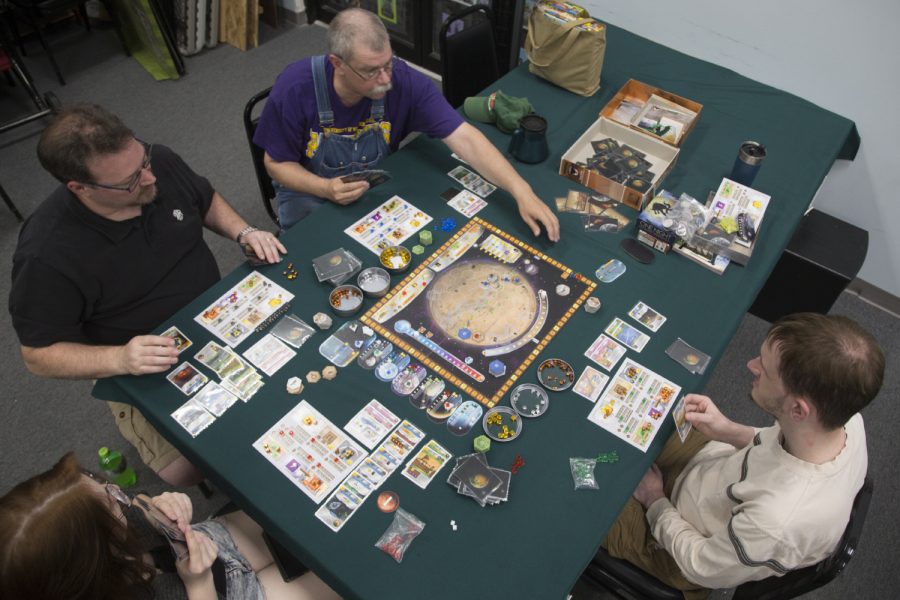Dragon fighting, dice, and Herky
With game boards, 20-side dice, and a little bit of magic, Iowa City’s tabletop community welcomes all who want to play.
Board game club attendees play a game at Hobby Corner located in the Sycamore Mall on Thursday, June 6, 2019. (Emily Wangen/The Daily Iowan)
June 11, 2019
With the popularity of board games rising, many businesses host game nights to bring the community together and welcome newcomers.
The setting is a dark and foggy forest. You and your companions have ventured for a long time on your quest, and finally, you all rally around an imposing, ghoulish opponent. The enemy raises its jagged weapon to strike — and suddenly, the unmistakable chime of a marimba starts to play from an iPhone.
Your time in the imaginative world of Dungeons & Dragons comes to an end, and everyday people from all walks of life are left sitting around a table with you in a local Iowa City tabletop shop.
The tabletop-gaming world has helped create not just fun evenings with friends but also deep relationships that can go beyond the game. Iowa City has seen its fair share of games, with a bustling community of tabletop and board gaming.
Recently, this form of gaming has got an incredible resurgence in today’s society, with the board-game market globally predicted to reach more than $12 billion by 2023, according to Globe Newswire. Yet some are left with the question, why? There are many theories on why such a rise in popularity of board gaming has happened recently, but Josh Karau points his finger toward media and movies.
“You can attribute it to geek culture being more accepted,” said Karau, a co-owner of North Liberty’s Geek City Games and Comics. “Shows like ‘The Big Bang Theory’ showed places like this as brightly lit things where there are awesome things going on as opposed to dank, dark basements.”
RELATED: Yerington: Comic books are sophisticated literature
This new public view of geek culture has helped gained a large amount of pride among the gaming community. With celebrities such as Vin Diesel and Rick and Morty creator Dan Harmon being vocal Dungeons & Dragons players, it has helped tear away the stereotypes of pocket protectors and bowl haircuts.
Another aspect of board gaming that may have led it back into pop culture is the way it tries to be more accessible.
“D&D is now the thing, ever since fifth edition went mainstream,” said Josh Woolums, a co-owner of the Hobby Corner, Iowa City Marketplace. “It’s a lot more streamlined. In previous editions, you had so many options to play with [that] it took forever. The streamlining is where it got more easy.”
With many people who attend gaming nights being newcomers, most will return regularly and create friendships with their game mates, he said.
“I’m surprised in how much outside time they all have together, too,” Woolums said. “They all don’t know each other at all at first, then a month later, they are all hanging out doing stuff.”
Board gaming might not seem like the most exciting way to spend an evenings in a university town, but Critical Hit Games co-owner Chance Kirchhof disagrees.
“With it being a college town, you don’t want it to just be bars and clothing,” Kirchhof said. “I like to think we add another dimension to downtown for something to do.”
RELATED: Cosplay: The art of bringing fiction to life
People shouldn’t feel intimidated if they don’t know much about gaming, said Michele Maakestad, the Iowa ambassador for Double Exposure’s board-gaming outreach program Envoy. Shops such as Critical Hit and the Hobby Corner pride themselves on their teaching communities.
Double Exposure is a convention company. Maakestad goes around to local shops and conventions for Envoy to show off smaller brands of board games.
“We try to build that community of people who are willing to teach,” she said.
This community tries not to just be one of fun and imagination but also of inclusion and welcoming. With quite a few players who come to each week’s gaming nights being first time players from all ages and walks of life, this culture needs to have open arms.
“We want to appeal to all groups,” Kirchhof said. “We want to make sure people always feel welcome here and included. We just love to play games.”



